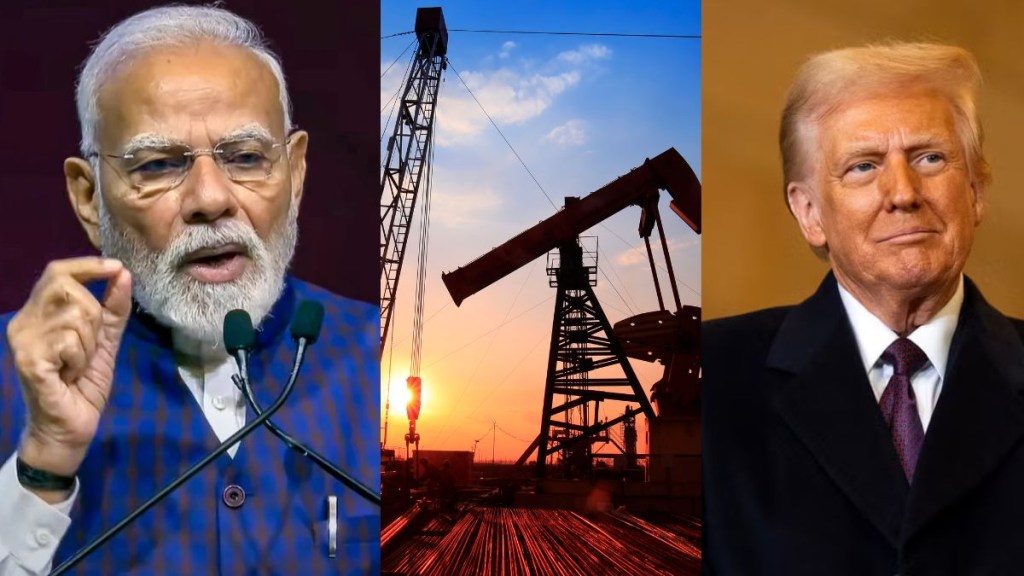Hours after US President Donald Trump said that Prime Minister Narendra Modi has agreed to halt India’s imports of Russian oil in an attempt to reach a final resolution in the ongoing trade talks between the two nations, the ministry of external affairs (MEA) here said on Thursday that discussions are on to deepen bilateral energy ties. The MEA, however, stopped short of confirming or refuting Trump’s claim.
Russia has emerged as the top supplier of crude oil to India after its invasion of Ukraine on the back of the heavy discounts it offered on its Urals.
Later in the day, MEA spokesperson Randhir Jaiswal told mediapersons that, “As for a telephone conversation, I can say that there has been no discussion between the Prime Minister and President Trump.”
Briefing reporters at the White House, Trump had appreciated that India could not stop the purchases of Russian oil “immediately”, adding that “it’s a little bit of a process, but the process is going to be over with soon”.
“I was not happy that India was buying oil, and he (Modi) assured me today (Wednesday) that they will not be buying oil from Russia,” he said. “That’s a big step. Now, I’ve got to get China to do the same thing,” he added.
The MEA’s initial statement said, “where the US is concerned, we have for many years sought to expand our energy procurement. This has steadily progressed in the last decade. The current Administration has shown interest in deepening energy cooperation with India. Discussions are ongoing”.
On Wednesday, Commerce Secretary Rajesh Agrawal told reporters that “India has headroom to purchase another $12-15 billion worth of energy without worrying about the configuration of Indian refineries, if oil is available at the right price”. This amounts to nearly doubling the purchase from the current level.
Reuters reported on Thursday that some Indian refiners are preparing to cut Russian oil imports, quoting three unidentified sources, following Trump’s statement.
India is the third-largest importer of oil and fourth-largest LNG importer. After the rising scrutiny by the US on India’s purchases of Russian oil, the country’s refiners have started diversifying their oil sourcing while continuing the purchase of Russian barrels.
Jaiswal said that ensuring stable energy prices and secured supplies have been the twin goals of India’s energy policy. “This includes broad-basing our energy sourcing and diversifying as appropriate to meet market conditions,” he added.
In the past 7-8 years, energy purchases from the US — largely crude oil – has come down from $25 billion to around $15 billion.
The US late August imposed 25% additional tariffs on India for buying Russian oil, taking the total additional import taxes on Indian imports to 50%.
The Indian government, since then, has indicated that it will continue to buy Russian oil if it is economically viable.
“It has been our consistent priority to safeguard the interests of the Indian consumer in a volatile energy scenario. Our import policies are guided entirely by this objective,” Jaiswal said in his statement.
Responding to Trump’s comments, Russia’s Ambassador to India, Denis Alipov, said that Russian barrels are very beneficial for the Indian economy, adding that Moscow doesn’t interfere in the decisions of other countries.
Asked whether India would continue importing Russian oil, Alipov said, “This is the question for the Indian government. The Indian government is having in mind the national interest of this country in the first place, and our cooperation in energy is very much in tune with those interests.”
Despite US pressure, Russia remained the largest supplier of crude oil to India in September with a 33.3% share. However, purchases from the Eurasian nation declined moderately from August levels, suggesting a slow diversification of oil sourcing by Indian refiners.
As per data provided by global real-time data and analytics provider Kpler, the country imported 1.6 million barrels per day of Russian oil last month, down 6% from 1.7 mbd in August.
In a political twist to the latest developments, Leader of Opposition in the Lok Sabha Rahul Gandhi on Thursday said that Modi is “frightened” of Trump, and alleged that the PM allowed the American president to “decide and announce” that India will not buy Russian oil and “keeps sending congratulatory messages despite repeated snubs”.
Prashant Vasisht, Senior Vice-President and Co-Group Head, Corporate Ratings, Icra, said that domestic refiners will purchase crude from various sources guided by economics and availability.
“While the overall volumes of Russian crude remain high, the discounts on Russian crude have been coming down owing to which the crudes from the Middle East have become attractive because of the geographical proximity of the region to India,” Vasisht said

